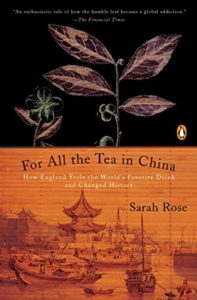 For All the Tea in China: How England Stole the World's Favorite Drink and Changed History by Sarah Rose
For All the Tea in China: How England Stole the World's Favorite Drink and Changed History by Sarah Rose Published by Penguin Books on February 22, 2011
Genres: Nonfiction
Pages: 259
Format: E-Book
Buy on Amazon
Goodreads

"If ever there was a book to read in the company of a nice cuppa, this is it." -The Washington Post
In the dramatic story of one of the greatest acts of corporate espionage ever committed, Sarah Rose recounts the fascinating, unlikely circumstances surrounding a turning point in economic history. By the middle of the nineteenth century, the British East India Company faced the loss of its monopoly on the fantastically lucrative tea trade with China, forcing it to make the drastic decision of sending Scottish botanist Robert Fortune to steal the crop from deep within China and bring it back to British plantations in India. Fortune's danger-filled odyssey, magnificently recounted here, reads like adventure fiction, revealing a long-forgotten chapter of the past and the wondrous origins of a seemingly ordinary beverage.
More than a history of the British East India Company’s dominance in the tea trade, this book is really about how one man, Robert Fortune, managed to steal tea plants, seeds, secrets, and expert growers and transplant all of them to India so that Britain could wriggle out of trading with China for tea. In order to accomplish this feat, Robert Fortune committed what Rose describes as “the greatest theft of protected trade secrets the world has ever known.”
It’s an interesting story, and at the heart of it is British racism—their feelings of superiority to the Chinese from whom they stole the tea and the Indians they subjugated to help grow it in India are certainly familiar to anyone with a passing understanding of British colonial history. This act of espionage contributed in many ways, great and small, to the world around us today, and in some degree, we may owe everything from Indian independence to Chinese communism in part to Robert Fortune’s theft of Chinese tea.
Among several interesting things I learned:
- The British East India Company basically “ruled” India until the Indian Rebellion of 1857. If I were a student in British schools, I might have learned this information in school, but since I went to American schools, I suppose it was not deemed important. Truthfully, most of the “world history” I learned was ancient history, and I learned very little about the last few hundred years in those courses. It blows my mind that a company, even one as large as the British East India Company, ruled a country.
- In large part, the insensitivity of the British East India Company in using beef tallow and pork fat as a lubricant in the Enfield P-53 rifle, offending both Hindu and Muslim Indians, was one of the leading causes of the Indian Rebellion.
- Wardian Cases were small “greenhouses” Robert Fortune used to transport tea plants. They actually worked pretty well, and the cases, along with Fortune’s idea to plant a few of the seeds rather than ship them unplanted, allowed them to germinate successfully.
- There are some teas, like Da Hong Pao, that are more valuable than gold in terms of cost per ounce. Da Hong Pao costs thousands of dollars per ounce.
Rose mentions in her “Notes” that because “this is a work of popular history, not a scholarly undertaking, I have avoided the use of footnotes and tried to steer clear of mentioning sources in the body of the text.” I think this was a mistake on her part, and it’s one of the major reasons the book doesn’t earn more than four stars, for though it was entertaining, nonfiction should provide this sort of information to its readers, even popular nonfiction. And much popular nonfiction does. On the other hand, it’s the kind of popular fiction I like to read: narrow in its focus on one person’s impact on the history of the tea trade.